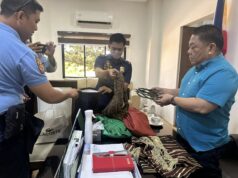SCIENCE CITY OF MUÑOZ – Agriculture Secretary Emmanuel Piñol affirmed here Tuesday that indeed a “shock wave” engulfed rice farmers in the country due to the passage of the tariffication law, with many expressing fear and others, anger.
He said the farmers rightfully predicted that the buying price of their palay harvest may now be lower than the usual price offered by the traders and rice mill owners.
“They are correct. The ex-farm price of palay in the country has gone down,” Piñol said during the consultation with (rice) stakeholders from the Cordillera Administrative Region (CAR), and from Regions 1, 2 and 3 at the Philippine Carabao Center (PCC) here.
The consultation was meant to gather inputs for the Implementing Rules and Regulation (IRR) of Republic Act 11203. The act, simply called rice tariffication law, is titled “An act liberalizing the importation, exportation and trading of rice, lifting for the purpose the quantitative import restriction on rice”.
Under this law, anybody who can secure phytosanitary clearance from the DA and pay the tariff can import rice.
In the past many decades, rice importation was a monopoly of the National Food Authority (NFA). This agency, according to the new law which takes effect on March 5, will be relegated to be keeping stocks as a buff er in case of acute rice shortage.
This law also indicated that the price of imported rice may be lower by P2 to P7 per kilogram than the current price of unhusked rice.
Thus, it can be a boon for the consumers who are complaining about the high cost of rice in the market.
But Piñol, in allaying the fears of farmers, said the “shock wave” may not be for long. He said the suggestion of various sectors to go growing cash crops for easy money is a short-sighted solution and it will it also be a suicide for the country if rice farming is abandoned.
It must be understood by all that there is thinning supply of rice in the world market. The available volume that can be accessed for importation is only three million metric tons,” he said.
He said that the rice exporting countries also experience the inevitable race between increasing population and rice production. He added that they (rice importing countries) are not having additional land area for rice production, thus they may keep their harvest in the future to feed their own population.
The agriculture secretary said the suggestion of various sectors to go growing cash crops for easy money is a short-sighted solution. He added that it will also be a suicide for the country if rice farming is abandoned.
The government is ready to provide assistance to our farmers especially to be competitive in rice production,” Piñol said. “We need to increase rice production in a way that is comparable with price of rice being sold by other countries,” he added.
P10 billion
Under the “Rice Competitiveness Enhancement Fund” (RCEF) provided by the law, with P10-billion funding annually for the next six years, it will give different kinds of assistance to the farmers to enhance their competitiveness and profitability.
“This fund will be used for farm machinery and equipment to improve farm operation, for rice seed development, propagation and promotion; for expanded rice credit and extension services, among others,” Piñol said.
The tariff that will be collected from importers, will be 35 per cent from those coming from members of the ASEAN countries, 40% for minimum access volume (MAV) of 350,000 metric tons from countries outside of ASEAN, and 180% above the MAV for non-ASEAN members. The expected collection from this tariff imposition this year is from P7 to P11 billion.
“Our Department of Agriculture, with the help of other departments, are programming how to improve the competitiveness in farm income, enhance resiliency to disasters and climate change, and in providing sources of irrigation to increase the volume of palay harvest in the country,” he said.
He revealed that he was given the go-ahead signal by President Duterte to clinch a deal for a P45 billion funding from the Republic of Belarus for solar-powered pumps for irrigation system. He said this is in addition to the assistance being provided by Israeli technicians in putting up solar-powered pumps for the irrigation needs of some 500,000 hectares in the country.
“If we can improve our irrigation system, including our rice seeds, and engage in massive farm mechanization with lowered production cost per kilogram, then our rice harvest will be competitive with the harvest of rice exporting countries” Piñol said.




